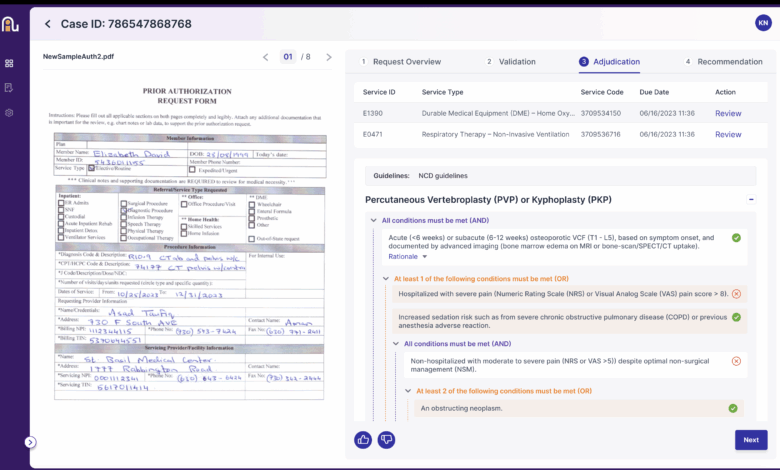
America’s healthcare system is at a breaking point—not only due to escalating costs that now surpass $5.1 trillion annually (nearly 19% of GDP) but also due to severe operational inefficiencies affecting patient care and clinical outcomes. Nearly 25% of this colossal expenditure is administrative waste, directly compromising care quality, clinician well-being, and patient satisfaction.
According to McKinsey, eliminating administrative inefficiencies could save up to $265 billion annually without impacting care delivery quality. Yet, entrenched manual processes, including prior authorization, claims adjudication, and clinical documentation, persistently hinder healthcare effectiveness and responsiveness.
Donald Berwick, former Administrator of the Centers for Medicare and Medicaid Services, has observed that today’s healthcare professionals find “themselves trapped in record keeping, coding behaviors, and productivity imperatives that believe the reasons many went into health care in the first place.”
The Core Crisis: Unstructured Data and Operational Chaos
Healthcare generates vast amounts of data daily, yet approximately 80% remains unstructured and inaccessible—locked in handwritten notes, scanned PDFs, fragmented electronic health records (EHRs), and disconnected legacy systems. Traditional automation methods like robotic process automation (RPA) fail within this complexity, leaving clinicians frustrated and patient care compromised.
Operational inefficiency directly impacts patient outcomes, increasing delays in critical treatments and creating gaps in patient care coordination. These delays exacerbate hospital readmissions and diminish overall patient health.
Why Agentic AI is the Essential Next Step
The introduction of Agentic AI marks a pivotal advancement in how AI is applied within healthcare. Moving beyond traditional automation, it enhances workflows by adding purpose and context to AI-driven tasks, ensuring that healthcare organizations can achieve tangible results with greater precision and intent.
Where traditional automation simply executes predefined actions, Agentic AI understands the complexities and nuances of healthcare, making it more adaptable to real-world challenges. This shift allows healthcare providers to seamlessly integrate AI into decision-making processes, where it not only supports but also augments clinical judgment. By leveraging real-time patient data and context, Agentic AI empowers healthcare professionals to make better, faster decisions with greater accuracy.
With its ability to evaluate multiple data sources and clinical criteria, including Carelon, InterQual, and internal guidelines, Agentic AI ensures that every decision aligns with clinical best practices, policies, and compliance standards. This deeper, more contextual application of AI translates into fewer errors, enhanced consistency, and improved efficiency across the board.
Additionally, by deploying AI in a transparent and auditable fashion, these systems are now tailored to meet the high standards of healthcare regulations, fostering trust and accountability. As healthcare organizations continue to adopt these intelligent, context-aware systems, they not only streamline operations but also elevate the quality of patient care, paving the way for a more AI-driven, patient-centered future.
Organizations deploying Agentic AI report immediate and substantial benefits:
- Prior Authorization Processing Time Reduced by 55%: From 35 minutes per case to less than 15 minutes, enabling rapid access to care for patients.
- 36,000 Clinical Hours Reclaimed Monthly: Dramatically reducing clinician burnout by eliminating administrative burdens, allowing professionals to engage more fully in direct patient care.
- 92% Efficiency Gains in Complex Document Processing: Streamlining document management processes, significantly accelerating clinical and administrative workflows.
- 16% Improvement in Medicare Compliance: Ensuring accurate, consistent, and timely compliance with regulatory mandates, enhancing patient safety and trust.
Reimagining Workflows, Restoring the Human Element
Agentic AI’s impact extends beyond operational efficiency—it plays a crucial role in improving patient outcomes. By streamlining care coordination and reducing delays, the technology helps ensure treatments begin more promptly, hospital stays are minimized, and patients experience better overall care. The result? A more efficient healthcare system that feels more responsive to the needs of patients.
In practice, this technology is transforming healthcare workflows. Rather than merely automating tasks, Agentic AI complements the work of clinical teams. It handles routine activities in areas like utilization management, claims processing, and quality assessments, providing actionable insights that integrate smoothly into daily care decisions. In this way, it enhances the agility and resilience of healthcare systems, helping them adapt to evolving needs.
Importantly, these solutions don’t necessitate a complete overhaul of existing infrastructure. By acting as an intelligent layer that integrates with legacy systems, Agentic AI connects disparate data sources—such as PDFs, faxes, and siloed EHRs—unlocking valuable clinical intelligence that may otherwise remain hidden. This integration enables healthcare organizations to operate more efficiently, respond to patient needs more effectively, and scale operations with greater flexibility.
Yet, the foundation of this technology lies in trust. Designed with robust governance and safety protocols, Agentic AI ensures transparency and accountability. With features like real-time audit trails, HIPAA compliance, SOC II certification, and alignment with emerging AI regulations, each insight and recommendation is traceable and explainable. This isn’t opaque, “black-box” AI—it’s a system built for clarity and confidence.
For healthcare leaders, the choice is clear: continue with outdated processes, or embrace a smarter, more efficient way forward. Agentic AI isn’t a distant vision—it’s a practical, proven solution that’s already making a difference today. By adopting it, healthcare organizations take an important step toward transforming their operations and improving patient care.
Looking Ahead: The AI-Driven Enterprise
The healthcare organization of the future won’t just use AI—it will operate as an AI-driven enterprise. That means shifting from reactive, fragmented workflows to intelligent systems that learn, adapt, and coordinate autonomously across departments. Agentic AI will underpin an architecture where every administrative action, clinical decision, and operational process is powered by intelligent agents—working continuously, learning context, and reducing friction in real-time.
In this future, utilization management won’t rely on emails or phone calls, but on proactive, AI-led reviews that flag potential issues before they disrupt care. Claims won’t get bottlenecked in manual queues—they’ll be triaged, verified, and approved or escalated with built-in intelligence. Care gaps will be identified not after the fact, but as they emerge—giving providers the opportunity to intervene sooner.
This isn’t about removing humans—it’s about elevating them. It’s about giving every nurse, case manager, and physician the cognitive edge they need to focus on what matters most: improving outcomes and restoring trust in the system. The AI-driven enterprise isn’t a distant vision. It’s a strategic reality—and the foundation for a healthcare system that finally works the way it should. The time for decisive operational transformation is now.



